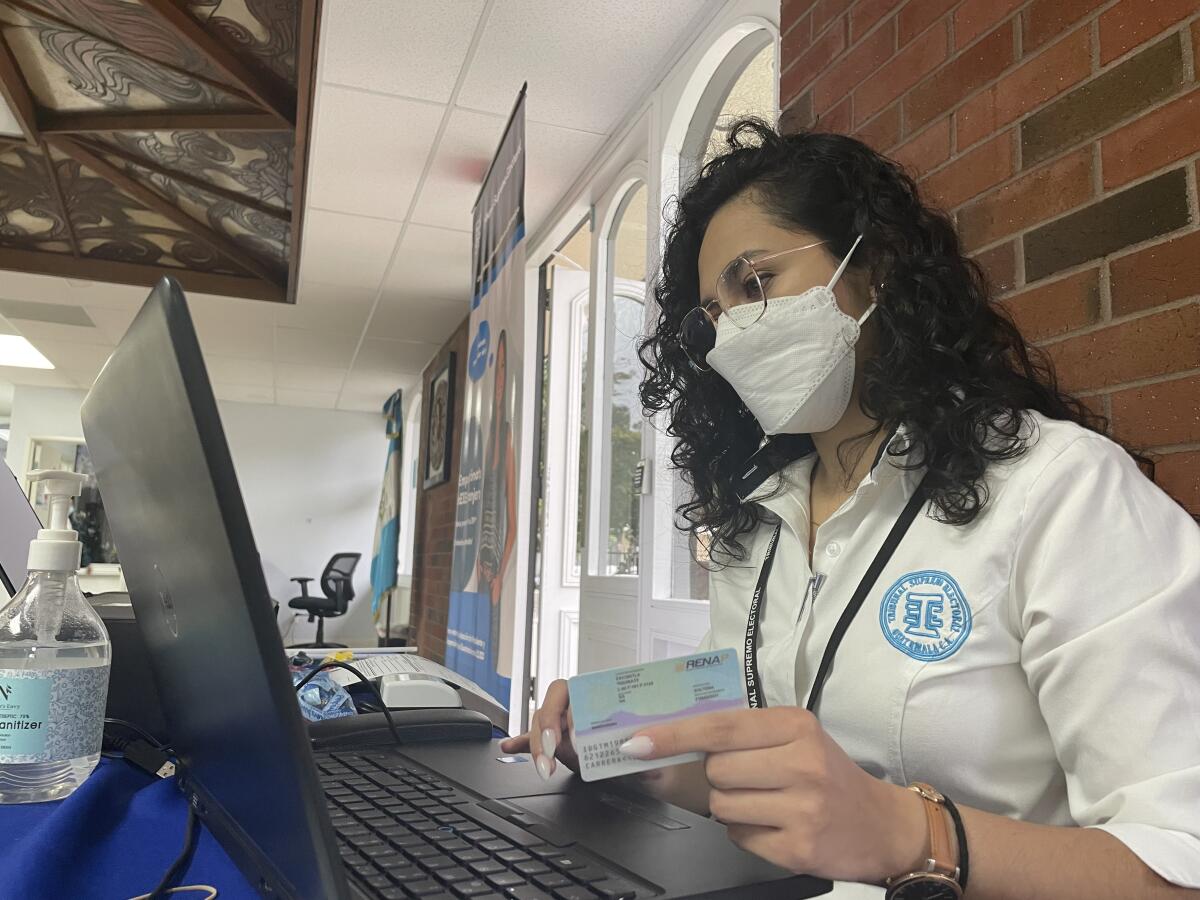âWe have to keep ... fighting for justiceâ: Guatemalans in U.S. will help choose next president

Four years ago, when Alejandro Giammattei was elected president of Guatemala, immigrants living in the United States were able to vote for the first time. In that experimental election, 734 votes were counted among the four polling stations that were installed in Los Angeles, Houston, New York City and Silver Spring, Md. â a tiny fraction of the more than 5 million votes cast.
But in this yearâs presidential contest, scheduled for June 25, there will be voting centers again in Los Angeles and Houston â the two U.S. cities with the largest number of Guatemalan immigrants â as well as in 13 other locations including Miami, Atlanta, Raleigh, N.C., and Chicago. The deadline for Guatemalans living in the United States to register to vote is Saturday.
Both in Guatemala, a country racked with violence, corruption and economic inequalities, as well as in expatriate communities in the U.S., the upcoming election is stirring up a host of anxieties. For Alicia Ivonne Estrada, a Guatemala native and professor of Chicano Studies at Cal State Northridge, it gives rise to fear and mistrust deriving from her experience in 2019, when she went to the local consulate to vote but wasnât allowed to cast a ballot.
âThere was an endless amount of bureaucracy that was inventedâ at the last minute, âand they did not allow the population that wanted to vote from abroad to do so,â said Estrada, a specialist in her countryâs diaspora.
Delegations from the Supreme Electoral Tribunal, or TSE, of Guatemala have been holding registration events on U.S. soil with the aim of expanding the electoral rolls and promoting participation among the migrant population.
âThe importance of the vote lies in the power of the people to seek the changes they want,â said Ingrid Soto, head of the TSEâs foreign vote.
Soto said that Guatemalans living in the United States who still are registered as voters in Guatemala will need to update their addresses, a process that can be done in person during the registration or through the TSEâs web portal.
To update an address or register for the first time, voters will need to produce a personal identification document, which can be processed at any of the 23 Guatemalan consulates in the United States.
According to the Pew Research Center, based on data from the U.S. Census Bureau, in 2017 there were 1.4 million people of Guatemalan descent living in the United States. But in the 2019 Guatemalan presidential election, only 63,043 of those were registered to vote.
As of March 6, the TSE website reported 86,703 registered voters, a figure that reflects both a continuing lack of engagement as well as the limited information that has been released about the election.
âI didnât know the truth,â said Gloria MĂ©ndez, a Los Angeles resident who 25 years ago emigrated from Villa Nueva, a few miles south of the capital, Guatemala City. âThe people who are here, if we donât know anything, we canât vote.â
Like many Guatemalans, MĂ©ndez takes a skeptical, even cynical, view of politics in general.
âAll governments promise, they never deliver,â she said. âWhether I vote or not doesnât matter anyway.â
Despite the apathy among many of her compatriots, Elizabeth Urrutia registered in January. The young mother, who came to California three years ago, said that before leaving Guatemala she studied legal sciences. Later, after setting up her own business, she became a victim of one of the extortion rackets that plague the Central American country, forcing her to emigrate.
âI was just asking my country for a chance, but there wasnât one,â she lamented.
When she fled Guatemala with her first child, Urrutia was pregnant. With the election approaching, she has been thinking of the loved ones she left behind. She believes that the ongoing problems that will confront the new government â job scarcity, the increasing cost of basic foodstuffs, the insecurity driven by drug cartels â make it important for Guatemalans to register.
âWe all have the right to choose and cast our vote,â she said.
In Los Angeles, 29 registration tables have been distributed across four voting centers. Guatemalans in San Francisco, San Diego, New York City, Atlanta and Houston also will be able to vote at polling centers close to their homes.
âWe still have to see the last count of the registration,â said Hugo MĂ©rida, who has been lining up voting centers and recruiting volunteer staffers. âFor every 600 people there must be an additional table. In Los Angeles we want to set up 29 tables because there are around 50,000 people on the registry.â
MĂ©rida said that since Feb. 13, when he took office, he has been working double time to set up and staff the centers, which are being supervised by regional election boards. The organizers of the electoral event say they will need about 900 volunteers.
âOur mission is to bring the polling stations as close as possible,â said MĂ©rida.
After voting ends June 25, each vote will be counted by the election boards under TSE personnel supervision. That information then will be sent by computer personnel to the TSE headquarters in Guatemala City.
Estrada emphasized that the TSE and the management of the election are under the control of a corrupt system, and that Guatemalaâs elections historically have not been transparent. Whether that ever changes may hinge in part on this yearâs outcome.
âIn these elections, it is at stake to return to the 1980s, where massacres, disappearances and military repression were seen,â Estrada said.
âVoting is important, but we have to keep organizing and fighting for justice in Guatemala,â she added.
More to Read
Sign up for Essential California
The most important California stories and recommendations in your inbox every morning.
You may occasionally receive promotional content from the Los Angeles Times.











